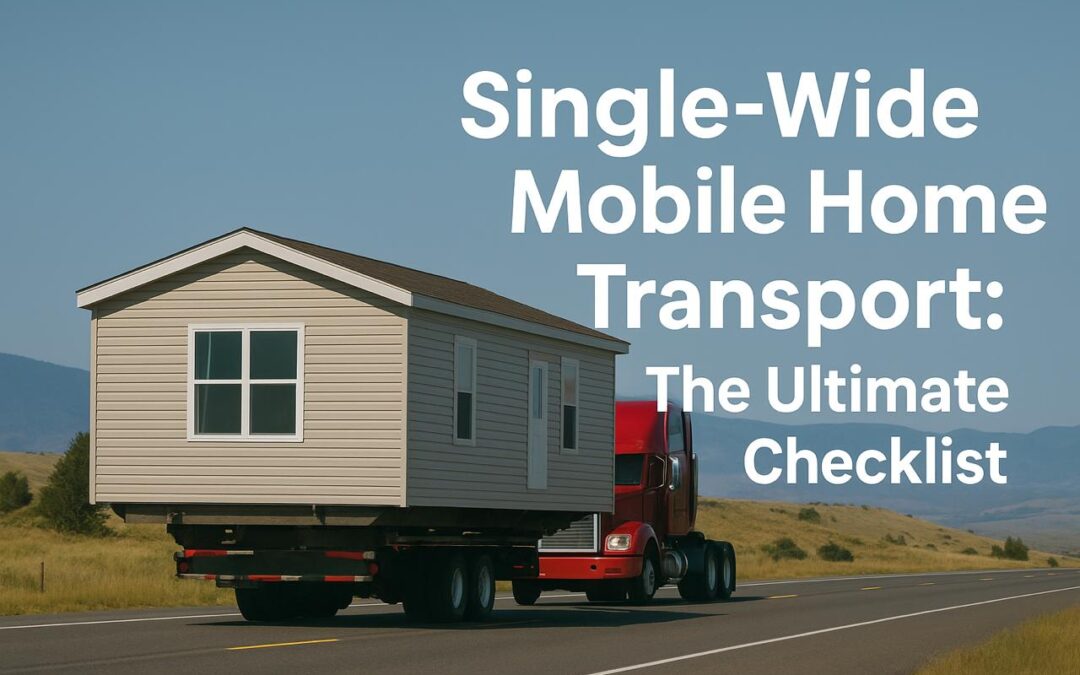
by info@mobilehomemovingcompanies.com | Sep 14, 2025 | Uncategorized
Transporting a single-wide mobile home is still a major undertaking that requires planning, permits, and professional movers. While single-wides are easier to move than double-wides, there are still many important steps to follow to ensure your relocation goes smoothly. If you’re searching for information on single-wide mobile home transport, this ultimate checklist will guide you from start to finish.
Why Hire Professional Movers for Single-Wide Transport?
Even though single-wides are smaller and lighter than double-wides, moving them still requires:
- Oversized Load Permits: States require permits for wide loads on highways.
- Specialized Equipment: Movers use hydraulic lifts, trailers, and pilot cars when necessary.
- Insurance Coverage: Licensed movers protect your home in case of damage during the move.
- Expert Setup: From leveling to utility hookups, movers make sure your home is move-in ready.
For details about available services, visit our services page.
The Ultimate Checklist for Single-Wide Mobile Home Transport
1. Planning & Permits
- Verify mover licensing and insurance.
- Secure necessary permits for your state and route.
- Schedule your move in advance.
2. Preparation Before the Move
- Disconnect all utilities (water, electricity, gas, sewer).
- Remove skirting, decks, porches, or exterior attachments.
- Inspect your home for any structural issues.
- Secure windows, doors, and interior belongings.
3. Moving Day
- Movers use hydraulic lifts to load your home onto a trailer.
- Escort vehicles are used if required by state law.
- Your home is carefully hauled to the new site.
4. Delivery & Setup
- Movers level and secure your home.
- Reconnect utilities.
- Reinstall skirting and porches if included in your package.
Average Costs for Single-Wide Mobile Home Transport
The cost of moving a single-wide depends on several factors:
- Distance: Local moves cost less than long-distance relocations.
- Permits & Escorts: Fees vary by state.
- Setup Services: Utility hookups and leveling increase total costs.
On average, transporting a single-wide mobile home costs $3,000 – $8,000. For an accurate quote, request a consultation through our contact page.
Tips for a Smooth Single-Wide Move
- Plan Early: Book your mover at least 2–3 months in advance.
- Do Some Prep Work: Handle minor teardown tasks to save money.
- Budget Wisely: Include hidden costs like landscaping or foundation setup.
- Hire Licensed Movers: Always verify credentials and insurance.
- Stay in Communication: Regular updates with your movers help ensure success.
For more moving insights, check our blog.
Final Thoughts
Transporting a single-wide mobile home may be simpler than a double-wide move, but it still requires professional planning and execution. With the right movers and preparation, you can ensure your relocation is safe, legal, and stress-free.
Get started today by reviewing our services or requesting a personalized moving quote.
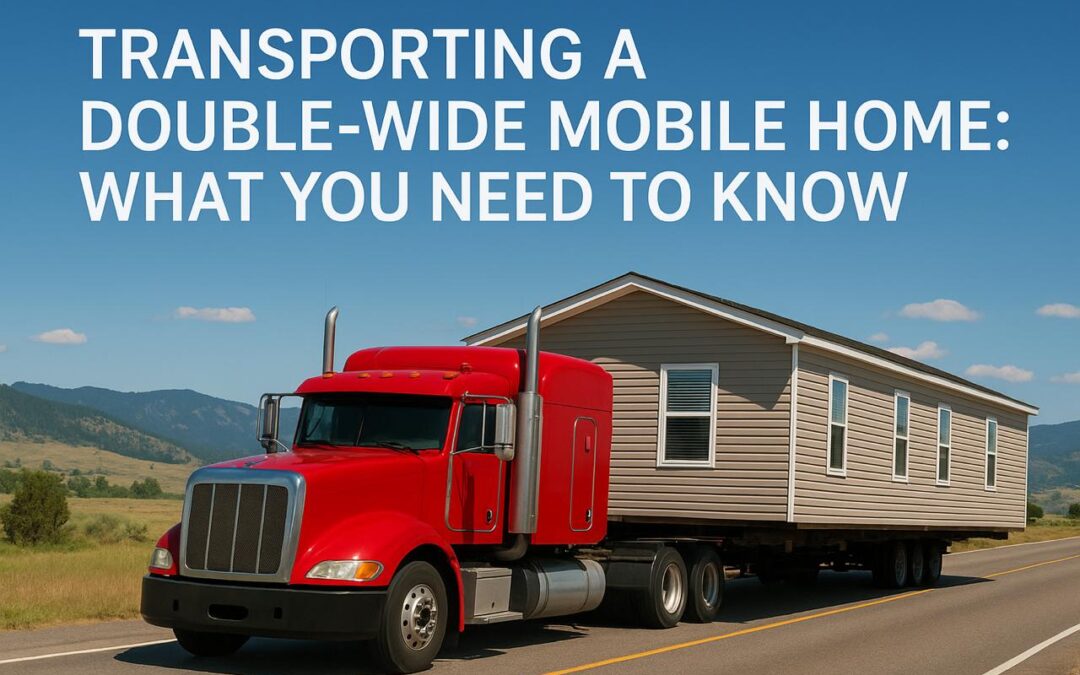
by info@mobilehomemovingcompanies.com | Sep 14, 2025 | Uncategorized
Moving a single-wide mobile home is challenging enough, but transporting a double-wide mobile home requires even more planning, equipment, and expertise. If you’re searching for double-wide trailer movers, this guide will walk you through everything you need to know about preparing, transporting, and setting up your home safely and legally.
Why Transporting a Double-Wide Mobile Home is Different
Double-wide homes are built in two separate sections that must be split before transport. Each section is then moved individually and reassembled at the destination. This process requires specialized equipment, experienced movers, and proper permits.
Key challenges include:
- Size & Weight: Double-wides are larger and heavier than single-wides, requiring escort vehicles and stronger transport equipment.
- Permits: States require oversized load permits, which movers must secure before relocation.
- Reassembly: Once transported, movers must carefully reconnect the two halves, ensuring structural integrity and utility hookups.
Steps to Transport a Double-Wide Mobile Home
1. Planning & Permits
Movers handle route planning, obtain oversized load permits, and arrange escort vehicles.
2. Preparation
Before moving day, homeowners should:
- Disconnect all utilities (electricity, gas, water, sewer).
- Remove decks, skirting, porches, or exterior features.
- Secure interior items like doors, cabinets, and fragile belongings.
3. Splitting the Home
Movers separate the two halves of the home, seal them for transport, and prepare each section for loading.
4. Transport
Each half is loaded onto a trailer and hauled separately, often accompanied by escort vehicles.
5. Delivery & Reassembly
At the new site, movers rejoin the two halves, level the home, and reconnect utilities. Skirting and porches can be reinstalled if included in your moving package.
For more service details, check our services page.
Costs of Double-Wide Mobile Home Transport
Transporting a double-wide is more expensive than moving a single-wide. Costs depend on:
- Distance: Local vs. long-distance relocation.
- Permits & Escorts: Fees vary by state and route.
- Size & Weight: Larger double-wides require more labor and stronger equipment.
- Setup Services: Reassembly and utility hookups add to the total cost.
On average, transporting a double-wide costs $7,000 – $20,000+ depending on distance and complexity. For a custom estimate, request a consultation through our contact page.
Tips for a Smooth Double-Wide Move
- Hire Experienced Double-Wide Movers: Not all movers handle double-wides, so verify experience.
- Plan Early: Start the process 2–3 months before your move.
- Budget for Extras: Include permits, escorts, and reassembly in your budget.
- Protect Your Home: Secure fragile items and remove valuables.
- Stay in Communication: Regular updates with your movers ensure a smoother process.
For expert moving advice, explore our blog.
Final Thoughts
Transporting a double-wide mobile home requires planning, permits, and specialized movers who can manage both the transport and reassembly process. By hiring professional double-wide trailer movers, you can ensure your relocation is safe, efficient, and stress-free.
Get started today by exploring our services or requesting a personalized moving quote.
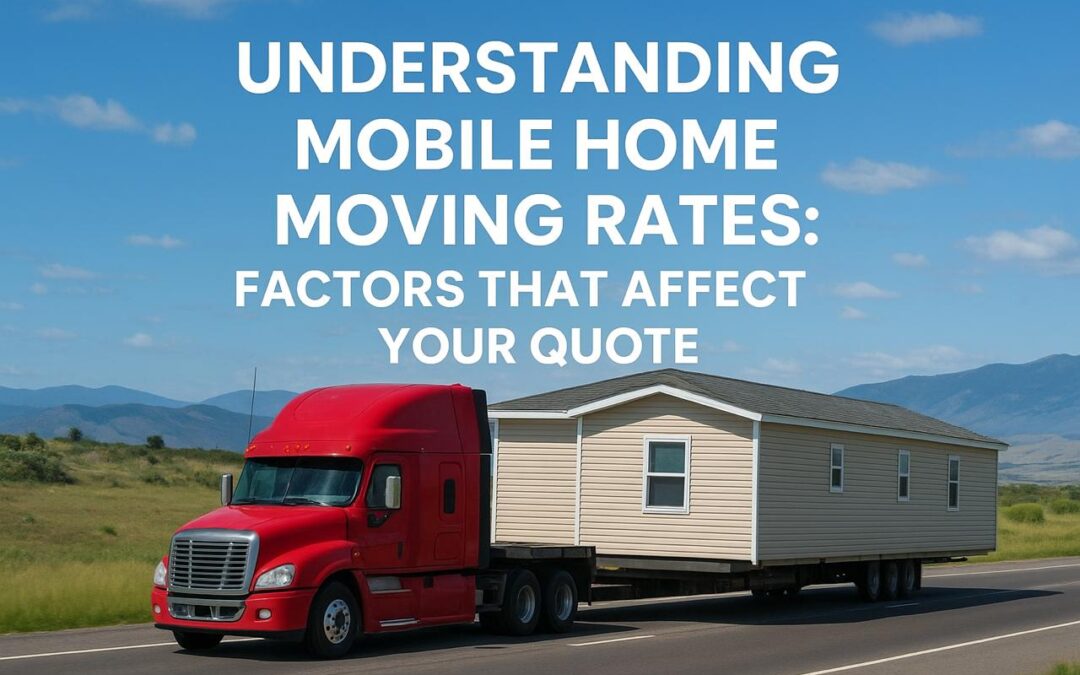
by info@mobilehomemovingcompanies.com | Sep 14, 2025 | Uncategorized
When planning to relocate a manufactured or modular home, one of the most common concerns is cost. While you may have already asked, “How much does it cost to move a mobile home?” the truth is that your final quote depends on several variables. In this guide, we’ll dive deeper into the factors that influence mobile home moving rates so you know exactly what to expect when requesting a quote.
Key Factors That Affect Mobile Home Moving Rates
1. Distance of the Move
The farther you need to move your home, the higher the cost. Local moves within the same city or county are far less expensive than cross-state or long-distance relocations. Long hauls may also require multiple escort vehicles and higher fuel charges.
2. Size and Type of Mobile Home
- Single-Wide: Typically less expensive to move.
- Double-Wide or Triple-Wide: Require splitting, additional equipment, and more labor.
- Modular Homes: May involve special transport and setup requirements.
3. Permits and Escorts
Each state requires permits for oversized loads, and some routes require police or pilot car escorts. These fees add directly to your moving rates.
4. Preparation Work
Before your home can be moved, utilities must be disconnected, skirting and decks removed, and the structure inspected for stability. The more preparation needed, the higher the cost.
5. Setup Services at the New Location
Many movers offer full-service packages that include delivery, leveling, foundation setup, and utility reconnections. While convenient, these services increase the overall rate.
6. Time of Year
Peak moving seasons (spring and summer) often come with higher demand, which can drive up prices. Scheduling your move in late fall or winter may help reduce costs.
Average Mobile Home Moving Rates
Here’s a general idea of what you might expect:
- Single-Wide (short distance): $3,000 – $8,000
- Double-Wide (short distance): $5,000 – $13,000
- Long-Distance Moves: $10,000 – $20,000+
Keep in mind that these are ballpark figures. For an accurate quote, request a consultation through our contact page.
How to Get the Best Quote
- Compare Multiple Movers: Don’t settle for the first quote—compare several.
- Ask About Inclusions: Make sure your quote covers permits, escorts, and setup services.
- Bundle Services: Movers may offer discounts for combined transport and setup.
- Do Prep Work Yourself: Disconnecting utilities and removing external features can reduce labor costs.
For a full list of professional services, explore our services page.
Final Thoughts
Understanding what impacts mobile home moving rates helps you plan a realistic budget and avoid surprises. Factors like distance, home size, permits, and setup services all play a role in determining your final moving quote.
For more tips and insights on mobile home relocation, check out our blog or get started with a personalized moving quote today.

by info@mobilehomemovingcompanies.com | Sep 14, 2025 | Uncategorized
If you’re planning to relocate your manufactured or modular home, one of the first questions you’ll have is: how much does it cost to move a mobile home? The answer depends on a variety of factors, including distance, home size, permits, and additional services. In this guide, we’ll break down everything you need to know about mobile home moving prices, quotes, and rates.
Why Mobile Home Moving Costs Vary
The cost of moving a mobile home isn’t one-size-fits-all. Several factors determine the final price:
- Distance of the Move: Short local moves are cheaper than long-distance relocations.
- Size of the Home: Single-wides are less expensive to move than double-wides or modular homes.
- Permits & Escorts: States require permits for oversized loads, and some moves require escort vehicles.
- Preparation Work: Disconnecting utilities, removing porches, skirting, and decks adds to the cost.
- Setup Services: Leveling, utility reconnections, and reinstalling skirting are usually extra.
Average Cost to Move a Mobile Home
Here’s a breakdown of average mobile home moving rates in the U.S.:
- Single-Wide (local move): $3,000 – $8,000
- Double-Wide (local move): $5,000 – $13,000
- Long-Distance Moves: $10,000 – $20,000+
These prices typically include transportation but may not cover setup or permits. For a more tailored estimate, request a mobile home moving quote.
Additional Costs to Consider
When budgeting for your move, don’t forget about these extra expenses:
- Permits: $200 – $1,000 depending on state requirements.
- Escort Vehicles: $1 – $2 per mile.
- Utility Disconnection & Reconnection: $500 – $2,000.
- Insurance Coverage: Protects against damage during the move.
- Site Preparation: Grading, foundation setup, and landscaping may be necessary.
Getting an Accurate Mobile Home Moving Quote
The best way to know what your move will cost is to request a detailed quote from licensed movers. Professional movers will consider:
- Your home’s size and weight
- Current and destination locations
- Road conditions and route planning
- Required permits and escort vehicles
To connect with licensed professionals, explore our services page.
Tips to Save Money on Mobile Home Moving
- Plan Ahead: Last-minute moves often cost more.
- Compare Quotes: Reach out to multiple movers for the best rate.
- Prepare the Site Yourself: Disconnecting utilities and removing skirting can save labor costs.
- Move During Off-Peak Seasons: Demand is lower in late fall and winter.
- Bundle Services: Some movers offer discounts if you combine transport and setup.
For more insights, visit our blog.
Final Thoughts
So, how much does it cost to move a mobile home? On average, anywhere between $3,000 to $20,000+ depending on size, distance, and services required. The key is to work with experienced, licensed movers who can provide a transparent estimate and ensure your home is relocated safely.
Ready to get started? Review our services or request your custom moving quote today.
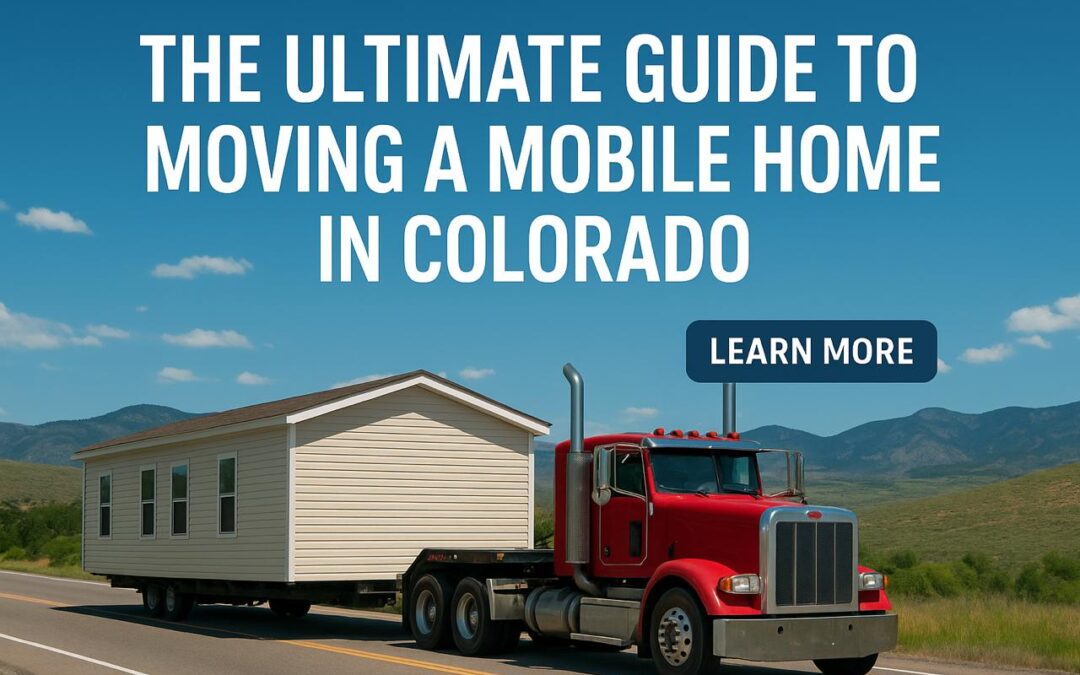
by info@mobilehomemovingcompanies.com | Sep 14, 2025 | Uncategorized
Relocating a manufactured or modular home is a major task that requires the right planning, permits, and expertise. If you’re looking for mobile home movers in Colorado, this guide covers everything you need to know—from permits to costs to tips for a smooth move in the Centennial State.
Why Hire Professional Mobile Home Movers in Colorado?
Moving a mobile home isn’t as simple as hitching it to a truck. Here’s why Colorado homeowners rely on licensed movers:
- State Permits: Colorado requires permits for oversized loads and specialized routes. Movers manage the paperwork with the Colorado Department of Transportation.
- Specialized Equipment: From hydraulic lifts to escort vehicles, movers have the tools to safely transport your home.
- Insurance Protection: Licensed movers provide insurance to protect your home during transit.
- Efficiency & Expertise: Professionals handle teardown, transport, and reinstallation quickly and securely.
Learn more about what movers offer on our services page.
The Mobile Home Moving Process in Colorado
1. Planning & Permits
Movers plan the route, obtain state permits, and arrange escort vehicles if required.
2. Preparation
Before moving day, homeowners should:
- Disconnect utilities (water, electricity, gas, sewer).
- Remove skirting, decks, porches, or external structures.
- Secure doors, windows, and fragile items.
3. Loading & Transport
Movers lift the home with hydraulic jacks, place it on a trailer, and transport it. Escort vehicles accompany oversized homes as needed.
4. Delivery & Setup
At the destination, movers level and secure the home, reconnect utilities, and reinstall skirting or porches if included in the service package.
For moving tips and advice, visit our blog.
Costs of Mobile Home Movers in Colorado
Moving costs in Colorado depend on:
- Distance: Local moves are less expensive than long-distance relocations.
- Home Size: Double-wides and larger homes require more labor and equipment.
- Permits & Escorts: Costs vary based on state regulations and route requirements.
- Setup Services: Complete teardown and reinstallation add to the total.
On average, Colorado homeowners can expect to pay $5,000 to $14,000 depending on distance and complexity. For a custom quote, request a consultation through our contact page.
Tips for a Smooth Mobile Home Move in Colorado
- Start Early: Begin preparations 2–3 months ahead of your move.
- Confirm Licensing: Always verify that your mover is licensed and insured in Colorado.
- Budget Wisely: Include permits, escorts, and utility reconnections in your budget.
- Protect Your Home: Remove valuables and secure fragile items.
- Stay Connected: Maintain open communication with your movers throughout the process.
Popular Areas for Mobile Home Moves in Colorado
- Denver: Urban relocations require traffic coordination and special permits.
- Colorado Springs: Moves across residential areas with growing mobile home communities.
- Fort Collins: Local and long-distance relocations for families and retirees.
- Grand Junction: Specialized moves requiring mountain route planning.
Final Thoughts
Hiring experienced mobile home movers in Colorado ensures your relocation is safe, legal, and stress-free. From permits to setup, professional movers handle the details so you can focus on enjoying your new home. Explore our services or contact us to get started today.
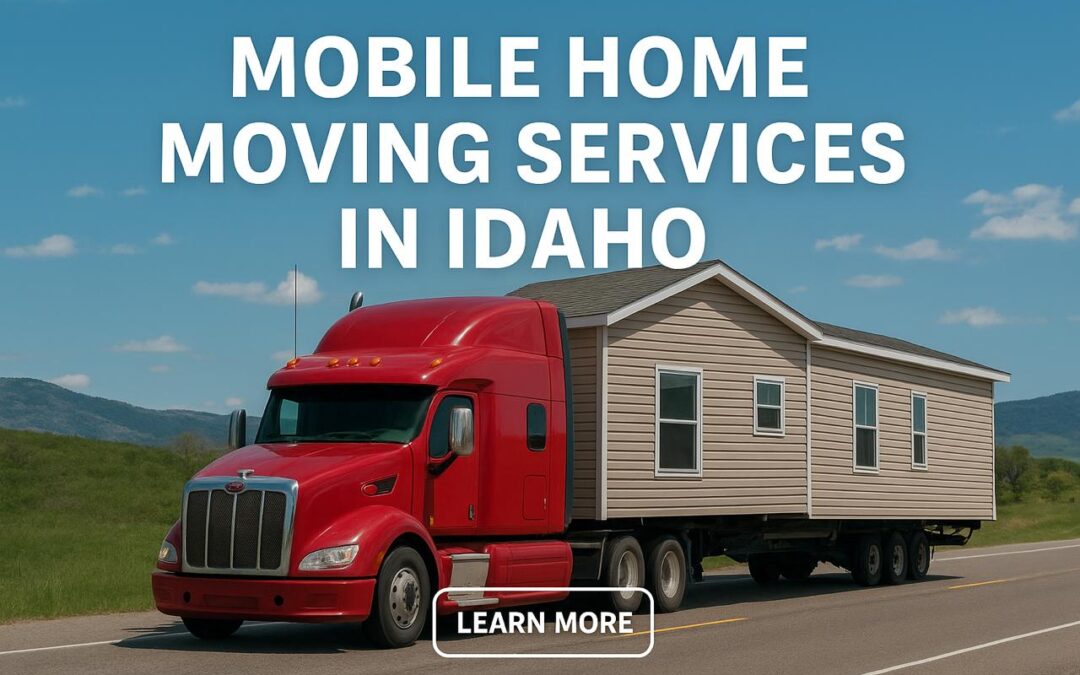
by info@mobilehomemovingcompanies.com | Sep 14, 2025 | Uncategorized
Relocating a manufactured or modular home in Idaho requires expert knowledge, proper permits, and the right equipment. If you’re searching for mobile home movers in Idaho, this guide will walk you through the process, costs, and tips for a stress-free move across the Gem State.
Why Hire Professional Mobile Home Movers in Idaho?
Mobile home relocation is a complex task that requires specialized skills. Here’s why Idaho homeowners rely on licensed movers:
- State Regulations: Idaho requires permits for oversized loads. Professional movers handle all paperwork with the Idaho Transportation Department.
- Specialized Equipment: From hydraulic lifts to pilot cars, movers use the right tools to move homes securely.
- Insurance & Protection: Licensed movers carry insurance to safeguard your home during transport.
- Efficiency: Professionals handle teardown, transport, and setup quickly and safely.
For more details on professional services, check our services page.
The Mobile Home Moving Process in Idaho
1. Planning & Permits
Movers obtain state and local permits, plan safe routes, and arrange escort vehicles if required.
2. Preparation
Homeowners must:
- Disconnect utilities (water, electricity, gas, sewer).
- Remove skirting, decks, porches, or external structures.
- Secure windows, doors, and fragile items.
3. Loading & Transport
Movers lift the home with hydraulic jacks, load it onto a trailer, and transport it with escort vehicles when necessary.
4. Delivery & Setup
At the destination, movers position, level, and secure the home. They reconnect utilities and reinstall decks or skirting if part of the package.
For expert moving advice, visit our blog.
Costs of Mobile Home Movers in Idaho
The cost of moving a mobile home in Idaho depends on several factors:
- Distance: Local relocations cost less than cross-state moves.
- Home Size: Double-wides or modular homes require more labor and equipment.
- Permits & Escorts: State regulations affect total expenses.
- Setup Services: Teardown and reinstallation services add to costs.
On average, homeowners in Idaho can expect to spend $4,500 to $13,000 depending on distance and services. For a tailored estimate, request a consultation through our contact page.
Tips for a Smooth Mobile Home Move in Idaho
- Plan Ahead: Start preparations at least 2–3 months before your move.
- Confirm Licensing: Always ensure your mover is licensed and insured in Idaho.
- Budget Properly: Factor in permits, escorts, and utility reconnections.
- Protect Your Home: Remove fragile belongings and secure openings.
- Stay in Communication: Keep close contact with your moving company.
Popular Areas for Mobile Home Moves in Idaho
- Boise: Urban relocations often involve navigating busy streets and city permits.
- Idaho Falls: Movers here frequently handle long-distance and rural moves.
- Twin Falls: Known for community-to-community relocations.
- Coeur d’Alene: Moves in this region may require special route planning through mountainous terrain.
Final Thoughts
Hiring expert mobile home movers in Idaho ensures your relocation is smooth, compliant, and stress-free. With the right movers, you can rest easy knowing your home is in good hands. Start planning today by reviewing our services or contacting us for a customized moving plan.
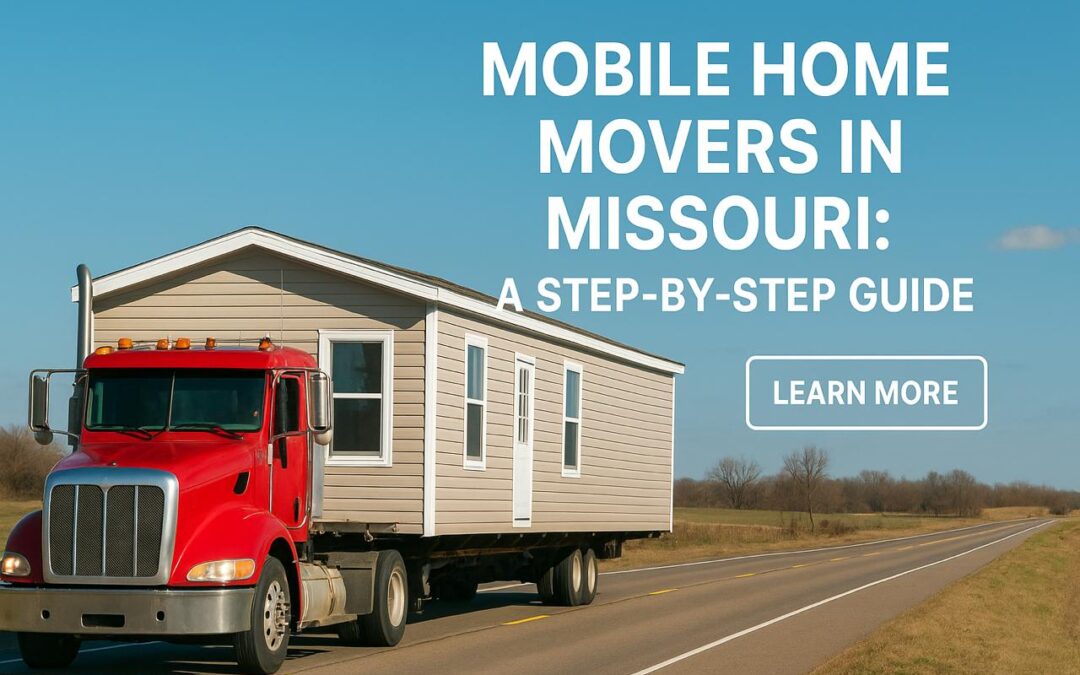
by info@mobilehomemovingcompanies.com | Sep 14, 2025 | Uncategorized
If you’re planning to relocate a mobile home in the Show-Me State, finding experienced mobile home movers in Missouri is essential. Moving a manufactured or modular home is more than just hitching it to a truck—it involves permits, specialized equipment, and skilled professionals who understand the process. This step-by-step guide will walk you through everything you need to know about moving your mobile home in Missouri.
Why Hire Mobile Home Movers in Missouri?
Relocating a mobile or manufactured home is no small task. Here’s why Missouri homeowners turn to licensed movers:
- Permits & Regulations: Missouri requires permits for oversized loads. Professional movers handle all the paperwork with the Department of Transportation.
- Specialized Equipment: Hydraulic lifts, custom trailers, and escort vehicles ensure your home is moved safely.
- Insurance Coverage: Licensed movers provide insurance protection during transit.
- Efficiency: Experienced crews manage teardown, transport, and setup quickly and professionally.
For a list of services available, check our services page.
Step 1: Planning and Permits
The first step in relocating your mobile home is planning. Movers apply for the necessary state permits and plan the safest route for your home’s journey.
Step 2: Preparing Your Home
Before the move begins, you’ll need to:
- Disconnect all utilities (water, gas, electricity, sewer).
- Remove skirting, decks, porches, or external structures.
- Inspect your home for structural soundness.
Step 3: Loading and Transport
Movers carefully lift the home using hydraulic jacks and place it onto a specialized trailer. Escort vehicles are arranged if required by law.
Step 4: Delivery and Setup
Once at the new location, movers will:
- Position and level your home.
- Reconnect utilities.
- Reinstall skirting, porches, or decks if part of your package.
For more moving insights, visit our blog.
Costs of Mobile Home Movers in Missouri
The cost of moving a mobile home in Missouri varies based on:
- Distance: Local moves are more affordable than long-distance relocations.
- Home Size: Double-wides and modular homes require more labor and equipment.
- Permits and Escorts: State requirements impact pricing.
- Setup Services: Full teardown and reinstallation increase costs.
On average, Missouri homeowners can expect to pay $4,000 to $12,000 depending on the move. For a tailored estimate, request a consultation through our contact page.
Tips for a Smooth Mobile Home Move in Missouri
- Plan Ahead: Begin preparations at least 2–3 months before your move.
- Budget Carefully: Include hidden costs like landscaping or utility hookups.
- Hire Licensed Movers: Always verify insurance and state licensing.
- Protect Your Home: Remove fragile items and secure doors and windows.
- Stay in Touch: Keep communication open with your moving crew.
Popular Cities for Mobile Home Moves in Missouri
- Kansas City: Urban moves requiring traffic coordination and special permits.
- St. Louis: Relocations across busy city areas demand detailed planning.
- Springfield: Movers handle both local and long-distance relocations.
- Columbia: Known for community-to-community mobile home moves.
Final Thoughts
Hiring experienced mobile home movers in Missouri ensures your move is stress-free and efficient. From planning to setup, professional movers handle every detail so you can focus on settling into your new home. Start planning your move today by reviewing our services or contacting us for a custom moving plan.
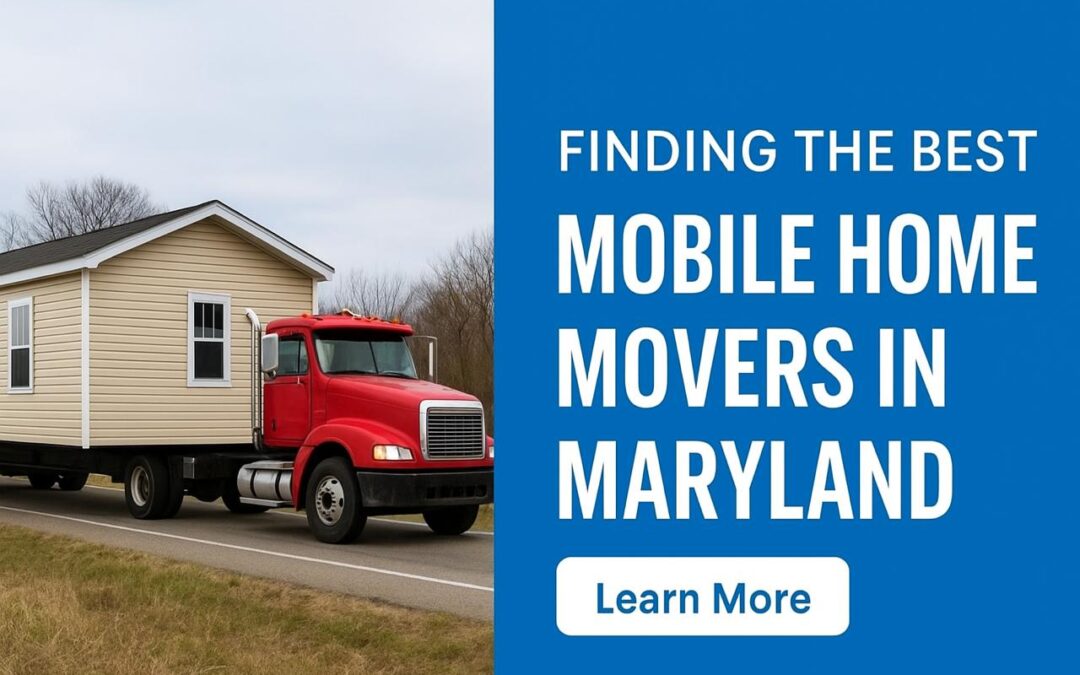
by info@mobilehomemovingcompanies.com | Sep 14, 2025 | Uncategorized
When it comes to moving a mobile home, hiring the right experts can make all the difference. Maryland homeowners searching for mobile home moving experts in Maryland want reliable, professional service that ensures their home is transported safely and efficiently. This guide will help you understand what to look for, the process involved, and how to choose the best moving company for your needs.
Why You Need Mobile Home Moving Experts in Maryland
Moving a mobile or manufactured home is far more complex than a standard residential move. Here’s why hiring licensed professionals is essential:
- Strict State Regulations: Maryland requires permits for oversized loads. Professional movers handle the paperwork and compliance.
- Specialized Equipment: From hydraulic lifts to pilot cars, movers use specialized tools to transport homes securely.
- Safety and Insurance: Licensed movers carry insurance to protect your investment during relocation.
- Time Efficiency: An experienced crew can tear down, transport, and set up your home much faster than a DIY attempt.
For a detailed breakdown of professional services, check out our services page.
The Mobile Home Moving Process in Maryland
1. Planning and Permits
Movers obtain the necessary permits from the Maryland Department of Transportation and map out the safest route.
2. Preparation
Before moving day, homeowners need to disconnect utilities, remove skirting, decks, or porches, and secure the home for travel.
3. Loading and Transport
Movers use hydraulic jacks and trailers to lift and move the home. Escort vehicles may be required depending on the route.
4. Delivery and Setup
Once at the new location, movers place, level, and secure the home. They reconnect utilities and reinstall skirting or decks if requested.
For more expert relocation tips, visit our blog.
Costs of Mobile Home Movers in Maryland
The cost of moving a mobile home in Maryland depends on several factors:
- Distance: Local moves are more affordable than cross-state or long-distance moves.
- Size of Home: Single-wide homes cost less to move than double-wides or modular units.
- Permits and Escorts: State and county permit fees, along with escort vehicle costs, affect the total price.
- Additional Services: Full setup and teardown add to the overall cost.
On average, homeowners can expect to pay $5,000 to $14,000 depending on these variables. For a custom quote, reach out via our contact page.
Tips for Choosing the Best Mobile Home Movers in Maryland
- Verify Licensing and Insurance: Always ensure the company is fully licensed in Maryland.
- Check Experience: Look for movers with a proven track record in mobile home relocation.
- Read Reviews: Online reviews and testimonials provide valuable insight.
- Compare Quotes: Don’t settle for the first estimate—compare multiple companies.
- Ask About Services: Make sure the mover offers setup, teardown, and utility reconnection.
Popular Maryland Areas for Mobile Home Moves
- Baltimore: Requires navigating busy urban routes and city permits.
- Annapolis: Moves often involve tight residential communities.
- Frederick: Known for rural relocations and long-distance moves.
- Hagerstown: Movers here frequently handle inter-state relocations into Pennsylvania or West Virginia.
Final Thoughts
Finding the right mobile home moving experts in Maryland ensures your relocation is safe, efficient, and stress-free. Whether you’re moving across town or to a different county, licensed movers can handle the logistics from start to finish. Start planning today by exploring our services or contacting us directly for a personalized moving plan.
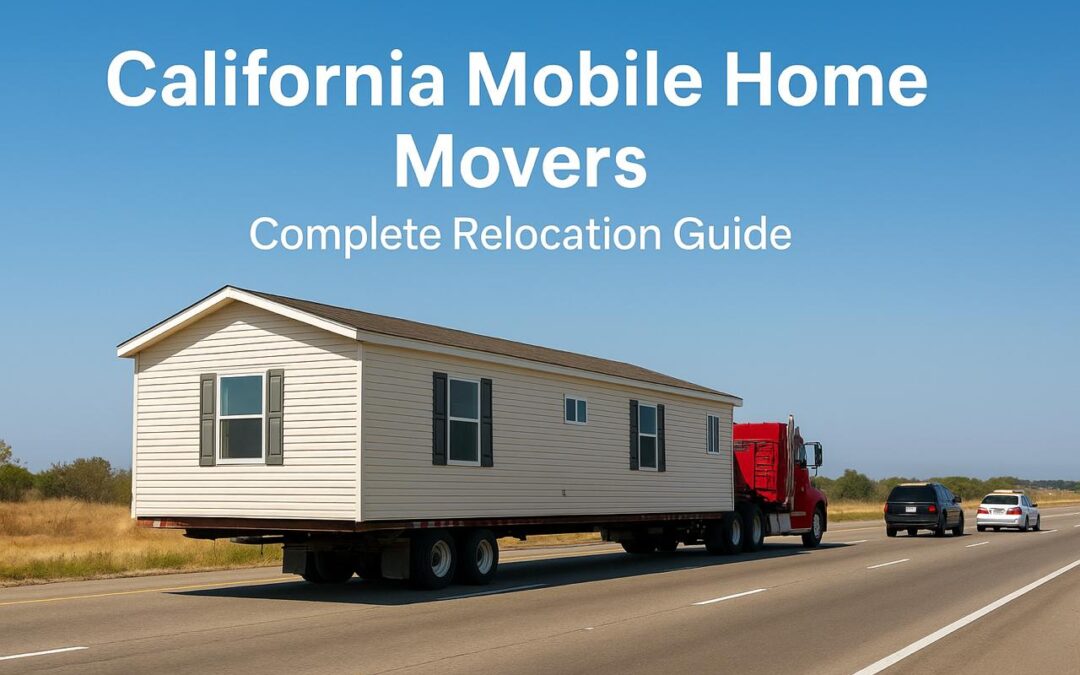
by info@mobilehomemovingcompanies.com | Sep 14, 2025 | Uncategorized
Moving a mobile home in California comes with unique challenges—from navigating strict state regulations to planning transport across busy highways and diverse terrains. Whether you’re relocating within Los Angeles, Sacramento, San Diego, or anywhere else in the Golden State, hiring professional mobile home movers in California is essential for a smooth transition. This guide covers everything you need to know before starting your move.
Why Hire Professional Mobile Home Movers in California?
Relocating a mobile or manufactured home requires more than just a truck and trailer. Here’s why Californians trust licensed mobile home movers:
- Complex Regulations: California has some of the nation’s strictest rules for transporting oversized loads. Professionals secure the necessary permits and follow safety standards.
- Specialized Equipment: Mobile home movers use hydraulic jacks, pilot cars, and custom trailers to safely transport single-wide, double-wide, or modular homes.
- Insurance & Liability Protection: Licensed movers carry insurance to protect your investment during transport.
- Experience with Terrain: From coastal routes to mountain passes, movers understand how to safely navigate California’s diverse geography.
For a breakdown of services movers provide, check the services overview here.
The Mobile Home Moving Process in California
1. Planning & Permits
Before the move begins, movers secure transport permits from the California Department of Transportation and coordinate with local municipalities.
2. Preparation
Homeowners must disconnect utilities, remove porches or skirting, and prepare the home structurally for transport.
3. Loading & Transport
Movers use hydraulic lifts to load the home onto a trailer and arrange escort vehicles for highway safety.
4. Setup at Destination
At the new site, movers place and level the home, reconnect utilities, and reassemble skirting or decks if required.
For additional relocation advice, explore our moving blog.
Costs of Mobile Home Movers in California
The cost to move a mobile home in California depends on:
- Distance: Local moves are less expensive than relocating across the state.
- Size of Home: Double-wides and modular homes require more equipment and labor.
- Permits & Escorts: California’s permit fees and escort requirements add to overall costs.
- Setup Services: Full-service moves that include teardown and reinstallation cost more.
On average, homeowners can expect to pay $6,000 to $18,000 depending on these variables. For an accurate quote, request a consultation through our contact page.
Tips for a Stress-Free Mobile Home Move in California
- Plan Months Ahead: Securing permits and scheduling movers in California can take longer than expected.
- Budget Accordingly: Include costs for permits, escorts, and utility reconnections.
- Hire Licensed Movers: Always confirm your mover’s license and insurance.
- Protect Your Home: Remove fragile items and secure doors and windows.
- Communicate Clearly: Stay in close contact with your moving team.
Popular Cities for Mobile Home Moves in California
- Los Angeles: Moves often require navigating heavy traffic and local permit rules.
- San Diego: Known for moves between mobile home communities along the coast.
- Sacramento: A hub for relocations within central California.
- San Francisco Bay Area: Requires detailed planning due to bridges and toll routes.
Final Thoughts
Moving a mobile home in California can be complex, but with the right professionals, it doesn’t have to be stressful. From securing permits to safe delivery, mobile home movers handle the hard work so you can focus on your new beginning. Start planning today by reviewing our services or contacting us directly for a customized moving plan.
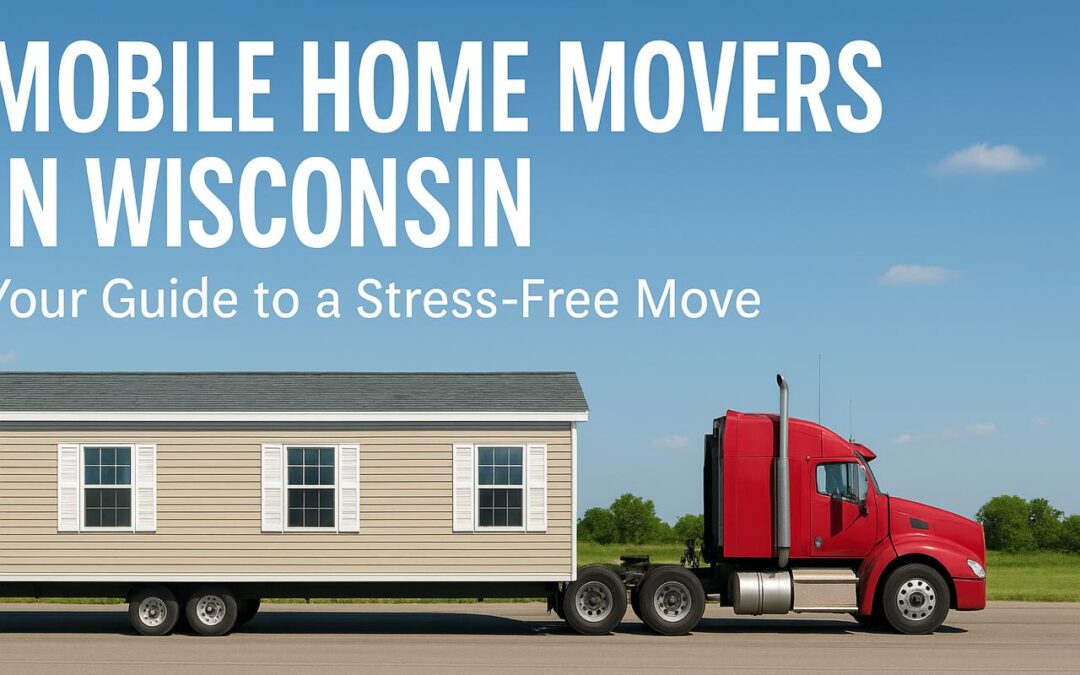
by info@mobilehomemovingcompanies.com | Sep 14, 2025 | Uncategorized
Moving a mobile home is not the same as loading up boxes and calling a moving truck. It requires careful planning, special equipment, state permits, and a team of licensed professionals who know the rules and logistics of mobile home relocation. If you’re searching for mobile home movers in Wisconsin, this guide will walk you through everything you need to know to make your move as smooth and stress-free as possible. For more insights on moving services, check out the Mobile Home Moving Companies blog.
Why Hire Professional Mobile Home Movers in Wisconsin?
While it might be tempting to save money by attempting a DIY move, relocating a mobile or manufactured home is a job best left to experts. Here’s why:
- Permits and Regulations: Wisconsin has strict rules about moving oversized loads, and your mobile home falls into that category. A licensed mover will obtain the proper permits from the Wisconsin Department of Transportation.
- Specialized Equipment: Mobile home movers use hydraulic jacks, specialized trailers, and escort vehicles to safely transport homes.
- Safety and Insurance: Hiring professionals ensures your home is protected in case of damage during transport.
- Time Savings: An experienced crew can handle setup, teardown, and transport efficiently, saving you weeks of hassle.
For a complete list of services that professional movers offer, you can explore the services page here.
The Mobile Home Moving Process in Wisconsin
1. Pre-Move Preparation
Before your home hits the road, you’ll need to:
- Disconnect utilities (water, gas, electricity, sewer).
- Remove skirting, decks, or porches.
- Inspect your home to ensure it’s structurally sound for transport.
2. Permits and Route Planning
Professional mobile home movers in Wisconsin secure moving permits and plan the safest, most efficient route. They also handle scheduling escort vehicles if required by state law.
3. Lifting and Loading
Your home is carefully lifted using hydraulic equipment and placed on a specialized trailer.
4. Transport
The home is transported to its new location. Depending on the distance, this could take a few hours or a couple of days.
5. Setup at New Location
Movers position your home, level it, reconnect utilities, and reinstall skirting or decks if part of the service package.
If you’d like a detailed consultation about your move, you can contact our team directly here.
Costs of Mobile Home Movers in Wisconsin
The cost to move a mobile home in Wisconsin varies based on several factors:
- Distance: Local moves are more affordable than cross-state relocations.
- Size of the Home: Single-wide, double-wide, or triple-wide homes require different equipment and crew sizes.
- Setup Services: Costs increase if you need full teardown and reinstallation services.
- Permits and Escorts: State permits and escort vehicle requirements also add to the cost.
On average, homeowners in Wisconsin can expect to pay anywhere from $5,000 to $15,000 depending on these factors. For an accurate estimate, it’s best to get a custom quote from trusted mobile home moving companies.
Tips for a Stress-Free Mobile Home Move in Wisconsin
- Plan Early: Start at least two to three months ahead.
- Budget Realistically: Factor in hidden costs like utility hookups, skirting, and landscaping.
- Hire Licensed Movers: Always verify insurance and state licensing.
- Prepare Your Home: Secure windows, doors, and remove exterior add-ons.
- Communicate Clearly: Stay in touch with your movers to avoid last-minute surprises.
Popular Wisconsin Cities for Mobile Home Moving
- Milwaukee: Urban relocations require extra permits and route planning.
- Madison: Popular for relocations between mobile home communities.
- Green Bay: Movers here are experienced with rural and suburban moves.
- Eau Claire: Known for long-distance and cross-state moves.
Whether you’re moving across town or across Wisconsin, choosing the right moving company can make all the difference.
Final Thoughts
Moving a mobile home in Wisconsin doesn’t have to be overwhelming. With the help of professional movers, proper planning, and the right resources, you can enjoy a stress-free relocation. If you’re ready to start planning your move, explore our services or contact us today for a personalized quote.










